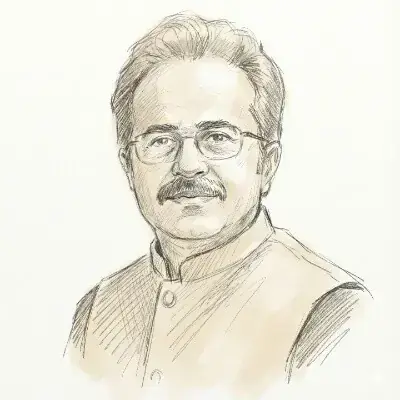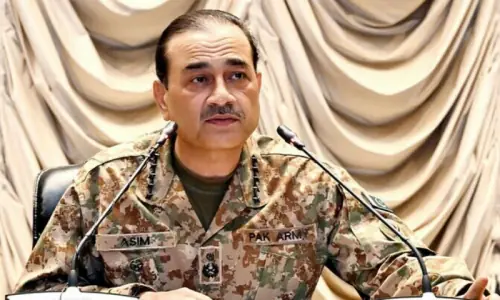• Investigators say ‘transnational roles of characters in Kenya, Dubai, and Pakistan’ cannot be ruled out
• Report finds ‘discrepancies’ in statements of Kenya police, Salman Iqbal, etc; SC asks govt for special JIT
ISLAMABAD: A two-member fact-finding team consisting of officers from the Intelligence Bureau (IB) and Federal Investigation Agency (FIA) has concluded that the murder of senior journalist Arshad Sharif was a “planned targeted assassination” which purportedly involved “transnational characters”.
In a 592-page report submitted to the five-member bench of the Supreme Court headed by Chief Justice Umar Ata Bandial, the investigators contested the version put forth by the Kenyan police, who termed Mr Sharif’s killing “a case of mistaken identity”.
The report observed that the “transnational roles of characters in Kenya, Dubai, and Pakistan” in this assassination cannot be ruled out.
The report noted a number of discrepancies in the events connected to the death of Mr Sharif and also highlighted contradictions in the statements of the ARY owner, Salman Iqbal, in connection with the case.
According to the report, the officials of the Kenyan General Services Unit (GSU) fired nine bullets at Mr Sharif’s vehicle from an AK-47 and a local Gilboa rifle. It, however, added that there was “only one fire (sic) whose trajectory doesn’t fit with the firing pattern”.
It disclosed that “there is no penetration mark of a bullet on the seat of Arshad Sharif but he was hit from the back and the bullet exited from the right side of the chest”. That does not match with his sitting position, and the position of gunners as well as the line of fire, it said and termed it a “closed range fire”.
The investigators were astonished to note that the “driver’s side door and window are undamaged, and the driver’s seat does not even have any splatters of blood, which is curious since one of the injuries to Mr Sharif was a head wound that caused his skull to shatter and spread hair, blood and bone particles over the passenger seat, the passenger side roof the car, and even on the rear passenger seat.”
It also pointed out the reasons that forced Arshad Sharif to leave Pakistan, including the registration of about a dozen FIRs. It expressed that there was a possibility that the journalist was compelled to leave Dubai.
Waqar’s link with spy agencies
The investigators noted that Mr Sharif’s host Waqar, a contractor of the US embassy in Nairobi, was connected with the Kenyan National Intelligence Service (NIS) and international intelligence agencies and police.
It said that Waqar was also known to a Pakistani politician and a senior official of the Inter-Services Intelligence (ISI) in Islamabad and when he was asked for CCTV footage of the residence of Mr Sharif, he replied that he made it conditional with the nod of the official of the spy agency.
The report said that “the fact that he handed over the personal cell phone and iPad of Arshad Sharif to an NIS officer rather than to police establishes his links with the NIS”. According to the report, “His linkage with national and international agencies provides a scope of possibility of transnational characters in this case.”
Likewise, the report also raised doubts on the conduct of Waqar’s borther Khurram who was driving the ill-fated Land Cruiser. The report said that the “narration presented by Khurram, who was driving the vehicle on the sequence of the crime scene is contrary to logic and facts”.
Role of Salman Iqbal
The report also shed light on the relations between Mr Sharif and the senior management of ARY, especially its owner Salman Iqbal.
“During his interview with the team, Salman Iqbal directly contradicted Waqar’s version and claimed he did not know Waqar…[and] had no other direct contact with him. He only knew that ‘Vicky’ was a good friend of Tariq Wasi”.
The investigators mentioned that Mr Iqbal failed to satisfy the team regarding his relations with Waqar and referred questions about the latter to Tariq Wasi.
“He [Tariq Wasi] responded in writing to the FFT questionnaire but his answers were not very illuminating or forthcoming. Many of his responses are contradicted by both Salman Iqbal and Waqar,” the report added.
According to the report, Tariq Wasi, directly linked with Waqar and who arranged for Arshad Sharif to be hosted by Waqar in Kenya, “would also become a key lynchpin for anybody wanting to murder Arshad Sharif” if the case had a transnational angle.
It said Salman Iqbal freely admitted that Waqar was approached to issue a letter of invitation to Arshad Sharif, nevertheless, in the initial days following Arshad Sharif’s death, some news reports, including those of ARY, continued to propagate that Arshad Sharif had gone to Kenya because Kenya had a visa on arrival policy.
The report also mentioned “discrepancies in the timelines” given by Mr Iqbal to the fact-finding team.
“Waqar claims that he called Tariq Wasi to inform him of Arshad Sharif’s death while he was driving from Ammodump camp to Oletepesi farm, essentially within the first thirty minutes of the incident. And it was during the same drive that Salman Iqbal called Waqar to get confirmation of Arshad Sharif’s death”.
However, Salman Iqbal claimed that he did not speak to Waqar till three to four hours after the incident, the report said, adding that Mr Iqbal had “contacted the senior army leadership to inform them of the fact that Arshad Sharif had been killed within an hour of the incident”.
It is not immediately clear why Salman Iqbal created this discrepancy over timelines, it added.
The report recommended the registration of the case with the Counter Terrorism Wing of the FIA under sections of the Pakistan Penal Code and the Anti-Terrorism Act.
Suo motu proceedings
The apex court bench resumed the hearing on the suo motu case regarding the killing of Arshad Sharif earlier in the day. As it took up the case, the top court directed the government to constitute a special joint investigation team (SJIT) to probe the killing of the journalist.
The eight-member team will comprise five police officials, and representatives of the ISI, FIA, and IB. Justice Bandial directed the federal government to notify the members by Thursday.
During the hearing, the mother of the slain journalist also filed an application before the court nominating senior military leadership, officials of the spy agency, and the public relations wing of the armed forces as accused.
The chief justice, after perusal of the application, said that “it could be [a] version of the complainant” and advised her to record a statement before the special JIT.
Published in Dawn, December 8th, 2022



































